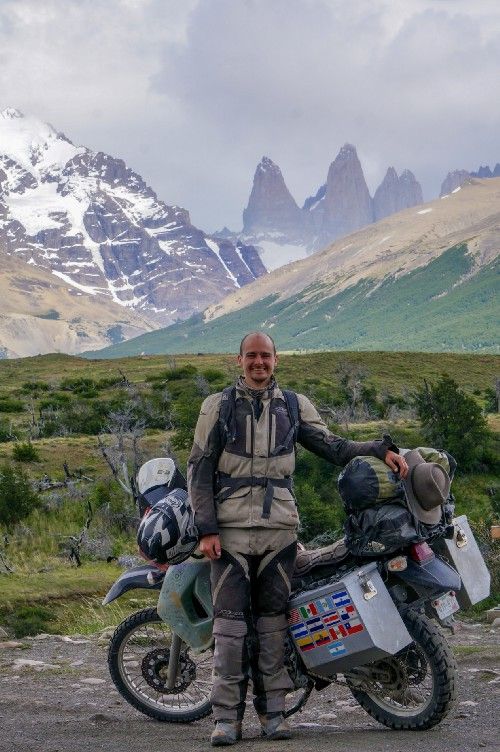Lost-Found: The Next Adventure

My name is Joe Tustin and I am the founder of Lost-Found (pronounced ‘lost and found’), a communication solution for lost items of sentimental and economic value.
Before I became a founder, I spent my career in software sales. But I wasn’t fulfilled, so I ended that career in 2017 and took a 15-month trip around the world. During that time, I traveled across 18 countries, 16 of them by motorcycle. The majority of the trip was spent riding from Denver, Colorado to Ushuaia, Argentina; which is located at the southern tip of South America.

While on the trip my bike broke more times than I can count, and I had to rely on the kindness of strangers to help me. I found I needed other people to help achieve my goals. But why would anyone help some gringo on a motorcycle?
Some cited the golden rule of treating others as you would want to be treated. Some said that they had dreams of doing what I was doing and were paying it forward. And as I reflect back on all the reasons why someone would not help me; I am surprised so many did without hesitation. Language barriers, technical challenges, and not to mention time constraints. Did I look so helpless and pitiful that I appealed to their genuine good heart? If so, I am quite lucky to have encountered so many good-hearted people and I am thankful for their actions. But I don’t think it was all luck.
Circumstances aside, I believe deep down it was a moment of true human connection that was at the root of it. A moment to shake them out of the concerns of their lives. A moment that was unexpected and appealed to the deeper meaning that is to be human. A moment to save the day. A moment to reflect and find pride that they would help such a lost and out of place soul. A moment to focus completely on what connects us and have no space to think about what separates us.
When I arrived home from my trip, I started studying computer programming and attended Flatiron School’s software development boot camp. Through the program I found I loved software development. I finally had a way to be creative and solve problems. This was a stark change from just selling software. I finally had a way of getting my own ideas out of my head and into the real world. Into the hands of people who could be helped by them. How cool.
While I have certainly enjoyed the last two years, I find myself missing those small but meaningful connections such as the ones I made when random people chose to help me while traveling. Those strange synchronicities of the universe that amounted to unexpected and impactful moments. I am convinced that there are moments like this happening all the time, but I don’t see them happen as frequently as they did on my trip.
I wanted to find a way that I could bring a bit more of that feeling to the world. Back to the mundane experience of the grind. People are faced with challenges every day. Other people unexpectedly help others every day. I don’t believe that these events are so rare. I just think people aren’t empowered to initially react that way. It’s a breakdown in communication. We’re constantly bombarded with fear-based marketing tactics appealing to our “lizard brain” that the thought of kindness is becoming foreign to us.
So, during the software development boot camp I created what I felt was a solution to a one of these communication problems. The communication problem of lost items. I realized that the entire industry of personal property trackers relied on the owner of the items having control of its location. This produced incredibly complicated and technically heavy solutions. None of which I felt were “good”. They play to users fear of the unknown and the elusive danger of the stranger. Not the good nature of human connection I saw existed in abundance during my trip.
I started thinking, what if we could create an entire biological neural network that could be activated the moment an item that you valued went missing. Truly missing, lost in the ether of public space. How could we communicate with such an item? How could we create a network so vast that things would be returned efficiently? And how would we incentivize such behavior?
What if we didn’t need to? What if we just created a framework of communication that was technology and language agnostic? What if we just relied on people to be people? What if we gave up a little control and swapped it out for faith in our neighbors, faith in human connection? What if instead of saying “oh that wouldn’t work because other people wouldn’t do it.” We asked, “Would I do it?”. Would I help return a set of keys if I knew I could get in touch with the owner?
What if we turned the whole idea of tracking on its head? What if we empowered people to have a moment to be recognized and to recognize another person in need? Then leave it to the universe and let the synchronicities of life play out. What if? Could such a radical idea work?
What if that entire biological neural network was just people believing that such an idea could work? What if we didn’t need to activate the entire network but only the person that mattered? The person in the position to help. What if that person was activated instantly because people are observant and would notice a personal item out of place? Followed by the empathy fueled human desire to communicate with the person who lost the item? What if we just removed all barriers of communication and educated people on the protocol and system? Putting the power back in their hands to do what they naturally want to do?
What if people saw a personal item out of place as a signal, a beacon of hope? If the finder and other bystanders understood that there was a person on the other end of that item. Someone just like them and they knew they had the power to easily help them.
What if such a system or network could exist purely based on believing in it? That such a safety net of people could catch you based on nothing other than being there. Could it change how we view the world and the people in it? Would anyone buy into it? Would anyone care?
I don’t have the answers to any of these questions, but I am on a path to answering them. My name is Joe Tustin and I am the founder of Lost-Found. It is a new way of thinking about an old problem. A human problem that I believe lost its way. I’ll be documenting my experience as I figure it out and sharing my results. If you would like to help test my idea, please send me a message at joe@lost-found.io. Thanks for reading and stay tuned
— Joe

